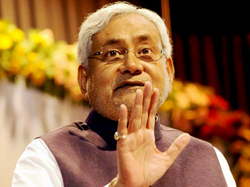Patna, Feb 20: Awaiting invitation from the Governor to form the new government, JD(U) leader Nitish Kumar today promised good governance once he takes over as chief minister and apologised for his decision to quit last year after his party's rout in the Lok Sabha elections.
He said he was ready to lead from the front and hoped to get the Governor's invitation to form the next government as he had staked claim over 10 days ago after JD(U) replaced Chief Minister Jitan Ram Manjhi with him as Leader of the Legislature Party.
"I want to assure the people of Bihar that if I get an opportunity again I will serve them in the same spirit I did for eight and a half year. Good governance was and will remain my priority.
"I also apologise for my decision to quit. I will never take an emotional decision again. Now I am ready to lead from the front," Kumar told reporters soon after Manjhi resigned.
Flanked by leaders of RJD, Congress who are supporting him and his own JD(U), Kumar said he had already staked claim to form the government on February 8 and next day after meeting Governor Keshari Nath Tripathi in person.
"We will wait for his (governor's) decision till tonight," he said.
"I am in no hurry to form government," he said in an apparent rebuttal to Governor's earlier comment he seemed to be in a hurry to become chief minister.
He, however, did not disclose if RJD, Congress, CPI and the independent MLA supporting him would be part of his government.
"Let the invitation from the governor come first. These questions will be relevant during formation of the government," a buoyant Kumar said.
Rejecting Manjhi's allegations against him, the former Bihar Chief Minister said he worked at BJP's behest and resigned because all "tricks" to break JD(U) failed.
"What BJP has done is a cruel joke with democracy. The horse (Manjhi) refused to run before the race. He had called for Budget Session today but ran away without facing the House. They left no attempt to split our party but our MLAs stood together like a rock. "All immoral works were being done on the prodding of BJP," he said.
In an apparent dig at Manjhi for allegedly playing the 'dalit card', Kumar said his work for the welfare of dalits and mahadalits was well known.
"It was me who coined the term mahadalit to provide more assistance to the poorest and deprived among weaker section (of society) to come above. Just being born in one such caste does not make a person a champion of the dalits and mahadalits," he said.
Kumar attacked BJP for playing the "caste card" by expressing views in favour of Manjhi that it could not bear to see the humiliation of a mahadalit.
"For the first time we (JD-U and BJP during the NDA regime in Bihar) picked a man from mahadalit caste Uday Narayan Choudhary to sit in the high constitutional post of Speaker of the assembly ... By making baseless allegations has BJP added to the respect for him?"
"A man whom the party (JD(U) gave an identity claims being champion on mahadalits and dalits," he said in an apparent attack on Manjhi.
RJD state President Ramchandra Purbe, his Congress counterpart Ashok Choudhary, CLP leader Sadanand Singh, lone CPI MLA Subodh Roy and independent Dulal Chand Goswami were with Kumar at the press conference at his 7 Circular Road residence.
He said a person in any constitutional post should not be identified by his/her caste as "such a thinking will break the society."
"Even when some leaders were attacking the then Bihar Governor Buta Singh and calling him the 'dalit governor' for not inviting me to form government in 2005, I had opposed it and said a governor is a governor and caste has nothing to do with it," Kumar said.
Kumar said if he got the chance to form government again, he would continue to do work with the same spirit as during past eight years. 'We will try to undo the damage to good governance of the past few days."
Defending the speaker, he said, "They (Manjhi and BJP camps) tried to brow beat him by making allegations against him and to precipitate immediate action against him with the Centre's help in a old case (murder of former RJD Gaya MP Rajesh Kumar). But, the speaker performed according to laws and rules," Kumar said.
"From the beginning we have been saying that only 12 MLAs out of a total of 110 JD(U) MLAs excluding the speaker were with Manjhi. Hence there was no point giving much time to him for the floor test.
Hitting out at BJP for propping up "a handful of JD(U) disgruntled elements" against him and writing the "script" of the events that happened in Bihar in recent days. "Their (BJP"S) gameplan has failed," Kumar said.





Comments
Add new comment